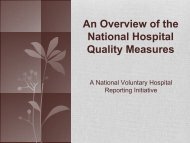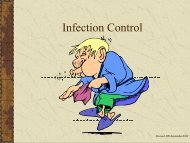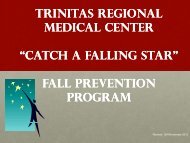Confidentiality and HIPAA - Trinitas Hospital
Confidentiality and HIPAA - Trinitas Hospital
Confidentiality and HIPAA - Trinitas Hospital
You also want an ePaper? Increase the reach of your titles
YUMPU automatically turns print PDFs into web optimized ePapers that Google loves.
<strong>Confidentiality</strong><br />
<strong>and</strong><br />
<strong>HIPAA</strong><br />
(Health Insurance Portability & Accountability Act)<br />
Revised: BW/September 2010
What Is <strong>HIPAA</strong>?<br />
• <strong>HIPAA</strong> st<strong>and</strong>s for the Health Insurance<br />
Portability <strong>and</strong> Accountability Act enacted<br />
by Congress in 1996.<br />
• This law created st<strong>and</strong>ards for the<br />
privacy <strong>and</strong> confidentiality of “individually<br />
identifiable” health information. This<br />
includes any information that may be used<br />
to identify a patient.
How Is Patient Information<br />
Used?<br />
• To determine what services the<br />
patient should receive such as:<br />
• Treatments<br />
• Medications<br />
• Physical therapy<br />
• Billing for the services the<br />
patient received<br />
• Quality review to ensure good<br />
care
Who Is Authorized to See<br />
Patient Information?<br />
• Health Department Officials<br />
• Reporting of information on communicable diseases.<br />
• Law Enforcement Officials<br />
• Reporting of child, spousal or elderly abuse <strong>and</strong>/or<br />
information that may be used in a trial.<br />
• Employees involved in patient care
Who Is Responsible for<br />
Patient <strong>Confidentiality</strong>?<br />
All <strong>Trinitas</strong> employees,<br />
clinical<br />
AND<br />
non-clinical,<br />
are responsible for patient<br />
confidentiality.
Examples of Protected<br />
Health Information (PHI)<br />
Confidential<br />
Information!<br />
• Details about illness<br />
• Information about treatments<br />
• Photographs or videos of a<br />
patient<br />
• Information on the patient’s<br />
chart<br />
• Conversations between<br />
physicians, nurses <strong>and</strong> the<br />
patient<br />
• Financial information<br />
• Employers<br />
• Relative’s s names
Tips for Protecting Patient<br />
<strong>Confidentiality</strong><br />
• Do not talk about patients in public areas.<br />
• Close patient room doors <strong>and</strong> pull the curtains when<br />
discussing health information with patients.<br />
• Keep your voice low when discussing health<br />
information with patients or other healthcare<br />
workers.<br />
• Never leave messages on answering machines<br />
regarding patient conditions or test results.<br />
• Never disclose patient information to unauthorized<br />
persons, including family <strong>and</strong> friends, unless the<br />
patient has given permission.<br />
• Do not leave patient identifiable information face-up<br />
or unattended in publicly accessible areas.
<strong>Confidentiality</strong><br />
<strong>and</strong> Technology<br />
• Computerized Records<br />
• Information on the computer is confidential,<br />
just like any other patient information.<br />
• Should be accessed on a need-to<br />
to-know basis<br />
as it relates directly to the care of that patient.<br />
C O N F I D E N T I A L
How to Protect Electronic<br />
Information<br />
• Never post passwords on monitors or walls.<br />
• Never share passwords with anyone.<br />
• Change your password regularly.<br />
• Always log off the system before walking<br />
away from your computer.<br />
• Point computer monitors<br />
away from visitors or people<br />
walking by.<br />
• Never leave patient records<br />
in computer printers.<br />
CONFIDENTIAL
Fax Transmission<br />
• Dial fax numbers carefully.<br />
• Use fax transmission sheet with<br />
confidentiality statement when<br />
faxing “outside” the <strong>Hospital</strong>.<br />
• Make sure the recipient is near the<br />
receiving fax machine when the<br />
information is sent.<br />
• Never leave papers with PHI in fax<br />
or copy machines.<br />
• Always file or dispose of faxed<br />
patient information before others<br />
can see it.<br />
All discarded PHI must be shredded<br />
or disposed of in a locked bin.
E-mail<br />
• Never share or open<br />
attached files from an<br />
unknown source.<br />
• Never send confidential<br />
patient information in an<br />
email unless it is encoded.<br />
• Always double-check the<br />
address line of an e-mail e<br />
before you send it.<br />
• Never share your password<br />
or log onto the system using<br />
someone else’s s password.<br />
• Remember: e-mail e<br />
is not for<br />
personal use.
Privacy Officer<br />
• Who is the <strong>Trinitas</strong> Privacy Officer?<br />
• Valdery Campos (ext. 5317)<br />
Director – Health Information<br />
• The Privacy Officer is responsible for:<br />
• Development <strong>and</strong> implementation of<br />
required policies & procedures<br />
• Compliance with the regulations<br />
• Complaints regarding the use <strong>and</strong><br />
disclosure of P.H.I. are referred to:<br />
• The TRMC Corporate Compliance Office:<br />
(908) 994-5346










